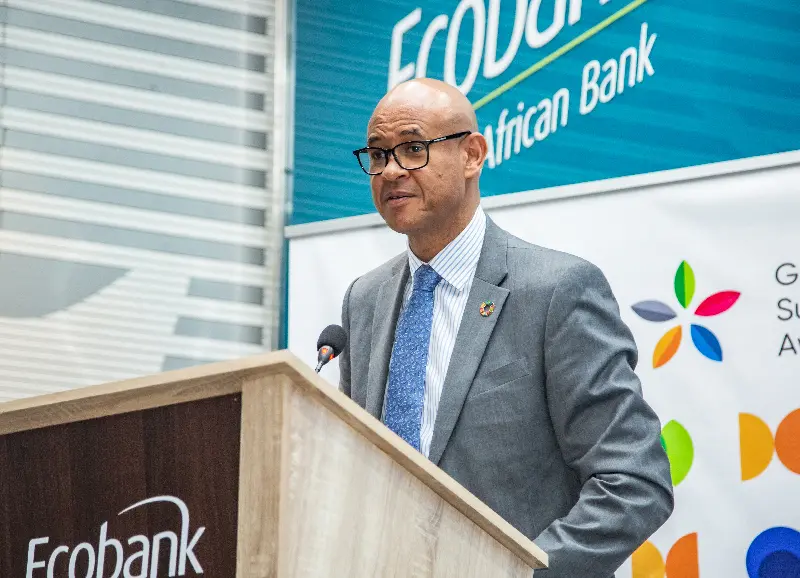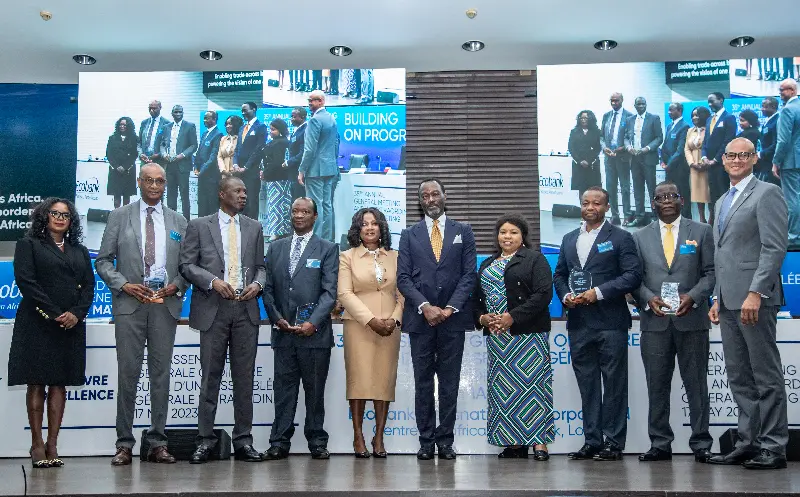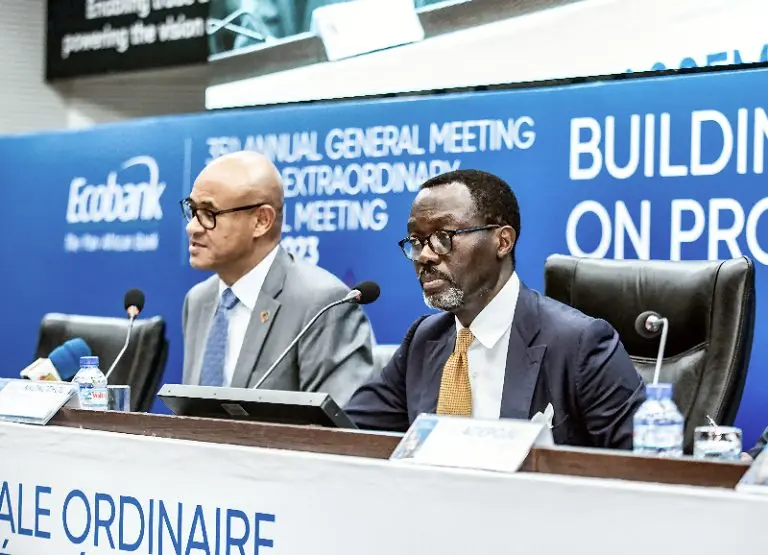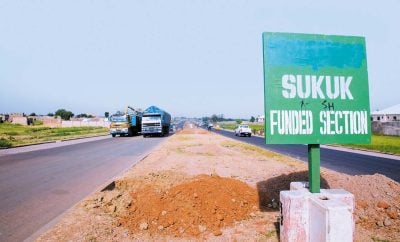
Alain Nkontchou, the Chairman of the Board of Directors, skillfully and effortlessly led the35th General Assembly of Ecobank, which took place at the conference center of the bank’s headquarters in Lomé. At the podium, facing the shareholders, were Secretary-General Madibiné Cissé and the complete fourteen directors of the bank. Nedbank, QNB, Arise, and PIC, the four main shareholders of Ecobank, alone hold more than two-thirds of the shares. With the next two, SSNIT and Moon, ownership reaches over 75% of the capital; the top ten shareholders hold more than 80% of the total.
In a short period of time, Jeremy Awori has already visited around ten countries. His
experience as a banker has prepared him well to skillfully lead this unique pan-African institution. Ecobank, the largest pan-African bank, has paid only $28 million in dividends this year, which is less than in the previous year. This cautious dividend distribution policy is in line with regulatory recommendations, but it goes against the interests of minority shareholders.
Although there were fewer attendees than usual at this year’s AGM, as always, the question-and-answer session was long and particularly lively. Small shareholders continued to complain about the lack of profitability of their investments. One Cameroonian shareholder stated: “The mother does not eat, while the daughters eat” pointing out that subsidiaries are distributing dividends while the holding company has been distributing very little over the past decade. Another African shareholder said “Our shares have melted like snow in the sun!”

The representative of the Nigerian shareholders shouted: “We want our Bank Back”. A small shareholder mentioned his bad experience, stating that he could not sell his shares. A Togolese professor and a large number of small shareholders strongly urged that attention should be given to their deplorable financial situation. One possible solution to finally address this recurring issue that sours every assembly would be for the bank to repurchase their shares at a favorable price. It would only be fair and essential for the bank’s image. It is a matter of ethics. African small shareholders have placed their trust in what they consider to be their bank, and their hopes have often been disappointed.
Prudent risk management
The year 2022 was severely impacted by inflation, rising energy and cereal prices, increasing interest rates, and the weakness of local currencies against the dollar. As a result, the exchange rate worked against Ecobank, whose accounts are denominated in dollars. Economic growth in Africa was less than 4%.
Despite these challenges, the banking group emerged stronger thanks to innovation, customer service, mobile banking, and online banking, which expanded its customer base significantly. The technological platform provided a satisfying customer experience. Risk management was cautious, with increased banking revenue and reduced costs. The 21% returns generated robust results.
The year 2022 was also marked by significant provision recovery in Nigeria, which was offset by substantial losses in Ghana due to monetary fluctuations in the country, despite it usually being one of the bank’s promising markets. The strong financial performance resulted in a 22% increase in Ecobank’s stock price in Nigeria, 7% in Ghana, and 6% on the Abidjan BRVM exchange.
After seven and a half years as CEO,, as he retires at the age of only 60, in accordance with the bank’s statutes, Ade Ayeyemi leaves a solid legacy to his successor Jeremy Awori, who arrives from Kenya with a solid career behind him.
It is extremely reassuring that the two men appreciate and respect each other. They have worked together for several weeks to ensure a peaceful and orderly transition. This is in stark contrast to what happened during the departure of Arnold Ekpé, the legendary banker who successfully established Ecobank at a rapid pace in 35 African countries and four abroad in Paris, London, Dubai and Beijing.
From 2015 to 2023, under the leadership of Ade Ayeyemi, Ecobank has regained profitability,.Its relentless pursuit of results has strengthened the foundation of the banking group. Ecobank is now among the top three banks in fifteen African countries. Profitability indicators are more robust and have a truly positive impact in the countries where the bank operates. The perspectives are promising despite the challenges.
Accelerating growth is now a paramount objective: the management team is doing everything possible to create value and wealth for a better future. The bank has to repay $700 million in loans in 2024. This year, it will need to borrow $500 million to meet its debt repayment obligations next year.
Every year, the Ecobank Foundation awards a Trophy for Sustainable Development. This year, the Foundation received fourteen submissions and selected five nominees. Sustainable development should reach over one billion Africans and foster African integration.

An effective duo
Alain Nkontchou and Jeremy Awori form a united, competent, and dynamic duo at the helm of Ecobank. The bank could not be in better hands to face the future and regain its heroic period of the past. Moreover, the Board of Directors has finally raised the retirement age to 62. The two leaders have a lot on their plate and will have to tackle several challenges and avoid pitfalls. It won’t be easy as the road is paved with obstacles. The two leaders are supported by a strong, dedicated, and committed management team that has understood and learned from past mistakes and made the necessary corrections.
In a short period of time, Jeremy Awori has already visited about ten countries. His banking experience has prepared him well to lead this unique pan-African institution with talent. Significant issues need to be resolved in order to quickly increase profitability and the value of the shares.

The press questioned the management of the pan-African group. However, a few questions remain: is it really necessary to have fourteen directors on the Board of Directors? Would their work not be better and more effective if they were fewer in number? Shouldn’t African ownership be strengthened to prioritise the long term and invest heavily in the bank’s development? Should the bank continue operating in countries that are not yet profitable but offer promising prospects? On this last point, the answer is certainly yes. This strong and cohesive strategy to secure Ecobank’s future is at stake. The goal is to return to the fundamentals and values of the founding fathers so that Ecobank remains a unique pan-African bank that brings pride to all Africans.
Want to continue reading? Subscribe today.
You've read all your free articles for this month! Subscribe now to enjoy full access to our content.
Digital Monthly
£8.00 / month
Receive full unlimited access to our articles, opinions, podcasts and more.
Digital Yearly
£70.00 / year
Our best value offer - save £26 and gain access to all of our digital content for an entire year!

 Sign in with Google
Sign in with Google 



